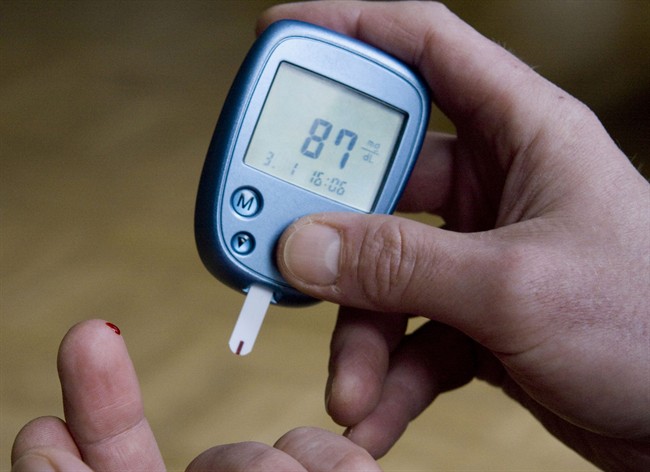TORONTO – Does your spouse have Type 2 diabetes? If so, you could be at risk of developing the chronic disease, Montreal researchers are warning.

Looking at the health of your partner could be a tell-tale sign on how your own health is faring, at least when it comes to Type 2 diabetes, McGill University scientists say.
“We found a 26 per cent increase in the risk of developing Type 2 diabetes if your spouse also has Type 2 diabetes,” senior author Dr. Kaberi Dasgupta said.
It’s a pretty significant finding and Dasgupta believes it might help with diabetes detection and motivating couples to work together for better health.
“This may be a platform to assist clinicians to develop strategies to involve both partners. Changing health behaviour is challenging and if you have the collaboration of your partner, it’s likely to be easier,” Dasgupta said.
READ MORE: New breed of guide dog helps patients with Type 1 diabetes
There are about 3.1 million Canadians living with diabetes – 90 per cent of which have Type 2, according to the national Diabetes Association. The organization says that another one million people are living with undiagnosed diabetes.
In Type 2 diabetes, your pancreas doesn’t produce enough insulin, or your body doesn’t properly use the insulin it makes. As a result, glucose builds up in your blood instead of being used for energy.
Dasgupta and her team wanted to see if diabetes in one partner could lead to diabetes in his or her spouse because of the lifestyle factors involved in developing the condition.
That includes poor eating habits and lack of exercise, which could be shared habits in a household.
The McGill analysis is based on six studies that were conducted in different parts of the world involving 75,498 couples diagnosed with diabetes.
READ MORE: Canadian doctors find key marker to help predict eye disease in diabetics
Dr. Janet Hux, chief science officer of the Canadian Diabetes Association, says she wasn’t surprised by the findings.
Couples tend to share one set of groceries, so they often have the same diet. If one member tends to spend more time in front of the TV, his or her partner could adopt the same lifestyle. They could also share the same levels of physical exercise.
They live in the same home, so they deal with the same neighbourhood design, accessibility to food, income to live off of.
“On that basis, we aren’t surprised of the increased risk but we find the study interesting because of the implications for prevention,” Hux told Global News.
She said that if one partner is diagnosed with diabetes, the other still has a chance at reversing his or her trajectory. If you’re at an elevated risk of developing the disease, a five per cent reduction in weight could be enough to reduce your chances by 60 per cent.
Hux said that couples should work together in changing lifestyle habits: eating more fruits and vegetables, cutting back on refined grains, and watching portion sizes.
READ MORE: Reality check: Could sugar substitutes cause diabetes?
Dasgupta said that doctors should pay attention to spousal health history – it could act as a tool for monitoring early diabetes detection. It’s especially applicable to men who tend to not keep up with doctor’s appointments compared to women.
“The results of our review suggest that diabetes diagnosis in one spouse may warrant increased surveillance in the other,” Dasgupta said.
The full findings were published Thursday night in the journal BMC Medicine.
carmen.chai@globalnews.ca
Follow @Carmen_Chai




Comments